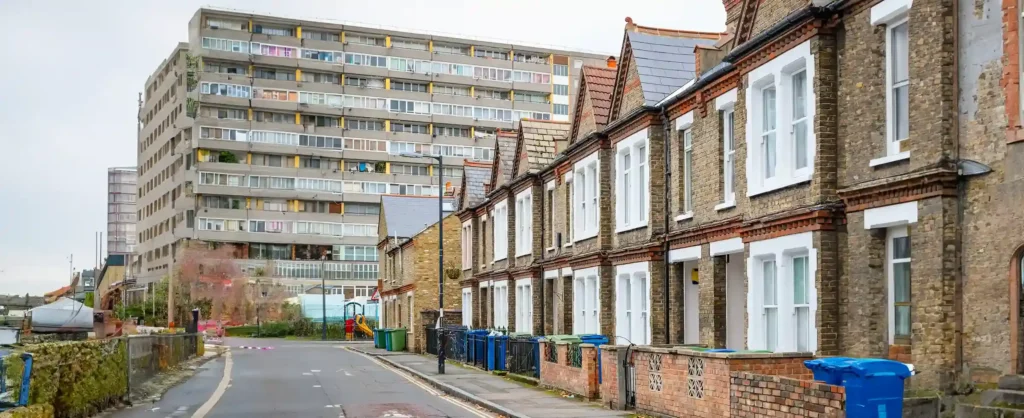What Is Social Housing?
In the UK, the term “social housing” refers to low-cost housing provided by government programming. People without the funds to buy a home or pay market rent can benefit from these programs which provide suitable housing at a lower cost through government assistance.
In recent years, the need for social housing has risen sharply. UK Parliament Archives estimate the need at around 340,000 new homes each year. Since 2010, the government in England has provided over 542,000 new affordable homes, which falls short of the estimated need at 340,000 per year.
The demand for affordable housing is still rising, and governmental programs are working to provide the needed housing, but private companies that are dedicated to closing the gap in the housing crisis are looking for solutions in the form of investors.
The positive social impact of investing in social housing extend beyond providing stable and secure housing for some of the UK’s most vulnerable renters and homebuyers.
A 2023 study carried out by the Greater London Authority (GLA) shows that increases in the supply of affordable and social housing can not only lower general housing costs in the long term, but also increase the affordability of other housing in the short term. This indirectly makes homes in the surrounding area more available, especially to low-income households.
Housing charity Shelter estimates that investing in social housing could add over £50 billion to the economy, including £12 billion in profit to taxpayers. This would require 90,000 social homes to be built and would also generate saving for the taxpayer across multiple departments, including the NHS.
Compared to the private rented sector, social rented homes are both more affordable and have more secure tenancies, with renters moving less and frequently. This makes them an ideal option for investors hoping to minimise their risk.
What Is Social Housing Investment?
Social housing investment is a method of investing funds into trusts aimed at increasing the amount of social housing in the UK.
There are multiple ways to invest in social housing. Large-scale investors looking for ethical investments and a fast, direct financial return may choose to partner directly with companies providing direct services towards increasing social housing, such as construction companies or housing associations.
However, the development of social housing investment funds has opened up avenues for private investment in the form of shares by everyday investors. This is drawing more interest to Real Estate Investment Trusts (REITs) by the everyday investor who wants to see a financial return on their investment and make a difference in the process.
Why Invest Privately?
Private investment in social housing allows the everyday investor the opportunity to add their funds to a trust that provides social housing on a large scale. In addition to seeing a return on their investment, private investors can also see the results of their investment in a tangible way.
Transparency on the part of these trusts provides a way to see the social impact of the fund. In addition, seeing the results of their investment in the form of new constructions and an increase in available affordable housing is an attractive aspect. Private investors like to see their money at work in their regions and communities.
Advantages of Social Housing Investment
When it comes to investing in social housing, there are generally more advantages than other property investments.
Whether you are a large-scale investor or investing in REITs, some advantages to investing in social housing include:
- Secured income – there is a higher probability of income from rent being paid because of government subsidy. The government pays anywhere from 30 to 70 per cent of tenant rent, so investors are guaranteed income.
- Far less vacancies – given the high demand for social housing, there is far fewer vacancies than other income properties. This cuts down on costs from vacant rentals or turnover.
- Vetted tenants – the government pre-screens all tenants in the housing subsidy program, so while doing your own screening is still advised, all tenants in social housing rentals have been screened to some extent.
These factors make investing in social housing more secure than a traditional income property. In addition, there are no mortgages with banks to worry about. Private investing in social housing provides a more secure way to diversify your portfolio and includes the added benefit of being a socially conscious investment that benefits the collective.
Potential Risks to Social Housing Investment
While there are factors about social housing investment that make it somewhat more secure than traditional income property investment, there are some factors to be aware of when investing in a social housing project.
Some factors to consider include:
- Potential funding changes – although the government provides security for the rental income, it is important to note that policy and funding streams can change. Keeping abreast of these changes and when they occur can help you understand the possible impact on your investment.
- Facility requirements – it is important to understand the government standards when it comes to facility refurbishments and other requirements. This may impact your costs and should be calculated when evaluating the yield from investment.
- Assessing the resale of the property – even though social housing is generally meant to be held long-term, this is an important factor to consider.
- Governmental requirements for renting – some aspects of leasing to government subsidised housing will be different than typical income properties due to government requirements superseding the standards you may be used to as a leaser. Be aware of things such as governmental inspections, lease terms, and rent control when you are considering your investment.
While social housing is on the rise as a popular investing strategy, it is important to have all of the information before you choose to invest so you are aware of potential costs and factors that can impact your investment.
Overall, making a social housing investment is a trend that is gaining popularity among ethical investors to get more than one type of return on investment.
Investing with Concept Capital Group
At Concept Capital Group, we offer an alternative solution for social housing investment that blends the ease of 360-degree management with the consistency and reliability of buy-to-let property investment.
We put social impact at the centre of our product and services, providing our clients with a unique opportunity to positively influence the UK housing market while securing passive income with less time commitment than traditional buy-to-let property.
To find out more about our social housing investment, book a call with our team today.













